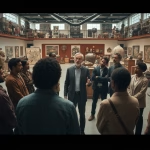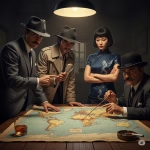- A Writer’s Guide to Point of View: Third-Person Limited vs. Omniscient
A Writer’s Guide to Point of View: Third-Person Limited vs. Omniscient Introduction: The Most Important Choice You’ll Make The point of view (POV) you choose is arguably the single most important decision you can make for your book. It affects every word choice, shapes which scenes you can show, and influences the reader’s entire experience from beginning to end. POV is the “voice” of your work—the lens through which the reader sees, hears, and feels…
- Briefing on Cultural Theory: Key Concepts and Debates
Briefing on Cultural Theory: Key Concepts and Debates Executive Summary This document synthesizes a wide-ranging body of scholarship on the analysis of culture, revealing several pivotal shifts and ongoing debates in the field. A primary development is the “cultural turn” in sociology, which has repositioned culture from a discrete object of study to a fundamental analytical lens for understanding all social phenomena. This “cultural sociology” insists that meaning-making is not a derivative of social structure…
- How the Detective Novel Became a Foundational Narrative Archetype Part 1
How the Detective Novel Became a Foundational Narrative Archetype Overview A comprehensive analysis of the detective novel, tracing its origins and historical evolution before exploring its profound and pervasive influence on all major fiction genres. The central argument is that the detective novel, beginning as a specific literary form in the 19th century, has transcended its genre boundaries to become a fundamental narrative archetype. Its core mechanism—the logical pursuit of truth through the analysis of…
- Chapter 3: The Global Diffusion of the Detective Story
Chapter 3: The Global Diffusion of the Detective Story The detective story is not an exclusively Anglo-American phenomenon; its narrative structure has proven to be a universal framework for exploring local social and cultural issues.1 In Italy, the genre, known as gialli, was heavily influenced by the American hardboiled school after World War II, using the investigative format to craft stories about flawed detectives and unsolved crimes.1 Similarly, in Spain, crime literature reflected the unique…
- Part II: The Great Integration: Detective Fiction as a Universal Narrative Engine
Part II: The Great Integration: Detective Fiction as a Universal Narrative Engine The detective novel’s enduring legacy stems from its core narrative structure, which is so fundamentally compelling that it has transcended its genre to become a universal narrative toolkit. The intellectual puzzle at the heart of the detective story—crime, investigation, clue, and resolution—is a mechanism that can be seamlessly integrated into other genres to drive plot, reveal character, and enhance tension. The following chapters…
 A Writer’s Guide to Point of View: Third-Person Limited vs. Omniscient Introduction: The Most Important Choice You’ll Make The point of view (POV) you choose is arguably the single most important decision you can make for your book. It affects every word choice, shapes which scenes you can show, and influences the reader’s entire experience from beginning to end. POV is the “voice” of your work—the lens through which the reader sees, hears, and feels…
A Writer’s Guide to Point of View: Third-Person Limited vs. Omniscient Introduction: The Most Important Choice You’ll Make The point of view (POV) you choose is arguably the single most important decision you can make for your book. It affects every word choice, shapes which scenes you can show, and influences the reader’s entire experience from beginning to end. POV is the “voice” of your work—the lens through which the reader sees, hears, and feels… Briefing on Cultural Theory: Key Concepts and Debates Executive Summary This document synthesizes a wide-ranging body of scholarship on the analysis of culture, revealing several pivotal shifts and ongoing debates in the field. A primary development is the “cultural turn” in sociology, which has repositioned culture from a discrete object of study to a fundamental analytical lens for understanding all social phenomena. This “cultural sociology” insists that meaning-making is not a derivative of social structure…
Briefing on Cultural Theory: Key Concepts and Debates Executive Summary This document synthesizes a wide-ranging body of scholarship on the analysis of culture, revealing several pivotal shifts and ongoing debates in the field. A primary development is the “cultural turn” in sociology, which has repositioned culture from a discrete object of study to a fundamental analytical lens for understanding all social phenomena. This “cultural sociology” insists that meaning-making is not a derivative of social structure… How the Detective Novel Became a Foundational Narrative Archetype Overview A comprehensive analysis of the detective novel, tracing its origins and historical evolution before exploring its profound and pervasive influence on all major fiction genres. The central argument is that the detective novel, beginning as a specific literary form in the 19th century, has transcended its genre boundaries to become a fundamental narrative archetype. Its core mechanism—the logical pursuit of truth through the analysis of…
How the Detective Novel Became a Foundational Narrative Archetype Overview A comprehensive analysis of the detective novel, tracing its origins and historical evolution before exploring its profound and pervasive influence on all major fiction genres. The central argument is that the detective novel, beginning as a specific literary form in the 19th century, has transcended its genre boundaries to become a fundamental narrative archetype. Its core mechanism—the logical pursuit of truth through the analysis of… Chapter 3: The Global Diffusion of the Detective Story The detective story is not an exclusively Anglo-American phenomenon; its narrative structure has proven to be a universal framework for exploring local social and cultural issues.1 In Italy, the genre, known as gialli, was heavily influenced by the American hardboiled school after World War II, using the investigative format to craft stories about flawed detectives and unsolved crimes.1 Similarly, in Spain, crime literature reflected the unique…
Chapter 3: The Global Diffusion of the Detective Story The detective story is not an exclusively Anglo-American phenomenon; its narrative structure has proven to be a universal framework for exploring local social and cultural issues.1 In Italy, the genre, known as gialli, was heavily influenced by the American hardboiled school after World War II, using the investigative format to craft stories about flawed detectives and unsolved crimes.1 Similarly, in Spain, crime literature reflected the unique… Part II: The Great Integration: Detective Fiction as a Universal Narrative Engine The detective novel’s enduring legacy stems from its core narrative structure, which is so fundamentally compelling that it has transcended its genre to become a universal narrative toolkit. The intellectual puzzle at the heart of the detective story—crime, investigation, clue, and resolution—is a mechanism that can be seamlessly integrated into other genres to drive plot, reveal character, and enhance tension. The following chapters…
Part II: The Great Integration: Detective Fiction as a Universal Narrative Engine The detective novel’s enduring legacy stems from its core narrative structure, which is so fundamentally compelling that it has transcended its genre to become a universal narrative toolkit. The intellectual puzzle at the heart of the detective story—crime, investigation, clue, and resolution—is a mechanism that can be seamlessly integrated into other genres to drive plot, reveal character, and enhance tension. The following chapters…